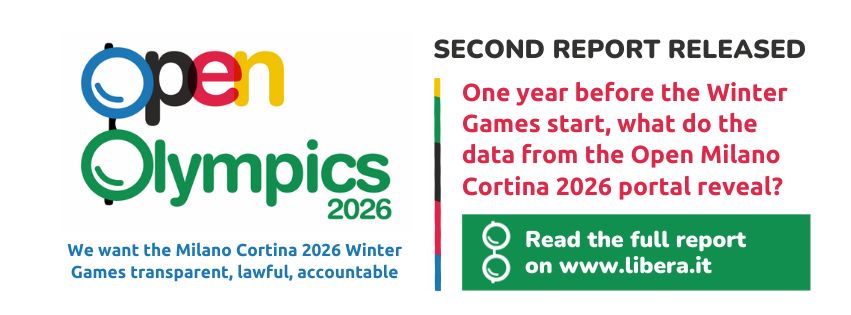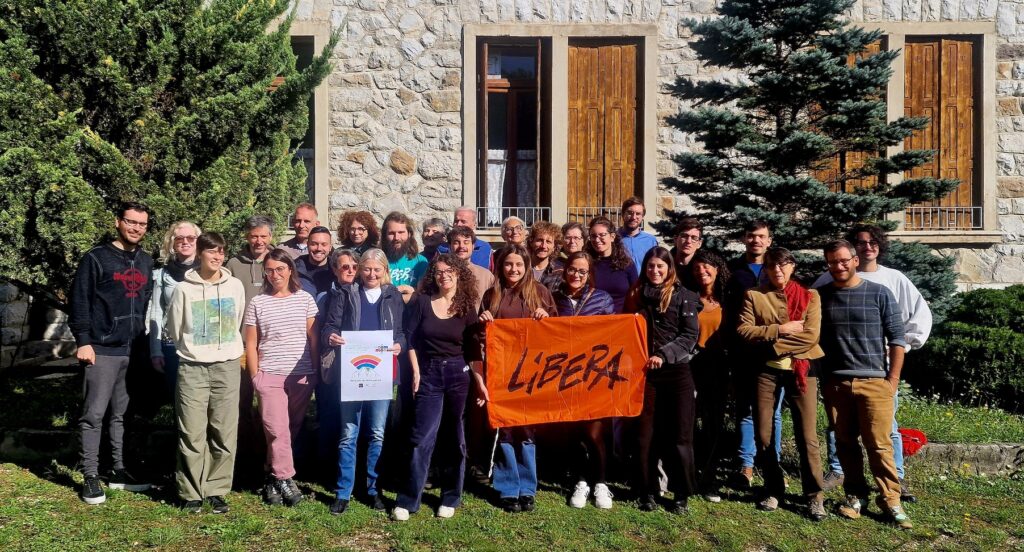Open Olympics 2026: progress and challenges

Many of you will know that we’ve always been interested in opening up and improving the procurement and contracts that underpin mega-sporting events, which have – all too-often been – vectors for cronyism, corruption or massive mis-spending.
Just before the pandemic at the very end of 2019, we had the pleasure of meeting the organizers of the 2026 Milano Cortina Winter Olympics along with civil society and experts from Milan and Nottingham universities to discuss best practices. It’s hugely positive that 20 Italian civil society organizations came together as a coalition to push for transparency and accountability in the delivery of the Games. In the blog below we hear from Elisa Orlando of the respected Italian anti-mafia organization Libera on both the progress so far (it’s significant) and the challenges remaining to set new global standards on delivering such an iconic event.
With just one year to go until the start of the Milano Cortina 2026 Winter Games, the Open Olympics 2026 campaign—promoted by 20 Italian civil society organizations—continues to push for transparency, accountability, and legality in the delivery of the Games.
When we launched the campaign in May 2024, we identified a lack of accessible, consolidated data on Olympic-related projects. Initial estimates suggested total expenditure would exceed €5.72 billion, split between the organization of the Games (€1.6 billion) and related infrastructure projects (€4.12 billion), mostly focused on improving roads and transport links.
Although there was an official delivery plan for the Games, as specified in a September 2023 governmental decree, we found data and documents on its delivery scattered across various public and private actors.
We made the case that without a central portal for tracking costs, contractors, and progress, the picture of both progress and costs would remain unclear. You can read more about it in our first report.
Our advocacy resulted in a significant milestone: the creation, in October 2024, of the Open Milano Cortina 2026 portal, hosted by the publicly owned company responsible for delivering the infrastructure around the Games (called Simico S.p.A.). This portal, updated every 45 days, provides crucial insights into planning and delivery of infrastructure projects under the official plan. This is the first Olympic and Paralympic event to commit to and deliver such a platform and it is a major win for advocates of better management and spending for mega-events [OCP note: Ha! We hoped to do this for Paris 2024 but it was not to be!].
While an important step forward, the portal still requires improvements to enhance usability, data completeness, and interoperability.
Progress on transparency and lessons for delivery
On February 14, 2025, we released the second Open Olympics 2026 report, analyzing for the first time the data from the portal (updated as of December 31, 2024). The findings highlight just why it is so important to bring the information together to get a coherent picture on spending and delivery:
- Out of the 94 projects currently tracked, 50% remain in the early stages (design or bidding), and only 6 out of 59 planned for completion by February 2026 are finished.
- Nine implementing bodies are involved, with Simico S.p.A. overseeing nearly 60% of the projects and managing 74.5% of allocated funds. In total, 340 companies, including subcontractors, are engaged, with 8% appearing in multiple contracts.
- Alarmingly, 60% of projects bypassed initial environmental impact assessments, as it was deemed unnecessary or not required under current regulations. This raises questions though about the long-term sustainability of the projects, which was a core promise of these Olympics and Paralympics. It would have been easy to have missed this bigger picture if the information has remained scattered.
- The highest expenditures are in Lombardy and Veneto (€1.3 billion each), yet Trentino leads in the number of projects (30).
- The Olympic bid projected «zero-cost Olympics.» Current state funding allocations stand at €3.19 billion, while the Simico portal reports €3.38 billion, leaving an unexplained €190 million difference. That’s a lot of money and the media have also been reporting on extra costs of €100 million. Who will be covering these expenses? Will tickets, broadcasting and other income still cover all these costs to make the Games zero-cost? Simico’s data classifies projects as «legacy» (roads, railways, etc.) or «Olympic event» (sports venues). Despite claims in the Olympics bid that legacy road and rail infrastructure needed only minor upgrades, spending on these is now 5.6 times higher than that allocated for essential Olympic-related projects, absorbing most public funds.

The road ahead
We have now been able to use the Open Milano Cortina 2026 portal in detail and analyze both its data, what’s missing and where we are on the delivery plan for the Games. As a campaign, we are now calling for:
- Full project disclosure: The portal currently lists 94 projects, but we want it to include all Olympic-related projects, both those included in the official plan (five projects are missing) and additional ancillary projects that are also connected to the Games but are being planned and delivered locally or by the private sector. For example, the full costs and details remain unknown for projects such as the Olympic village in Milan, two ski links from Cortina, and the Val di Riga railway line. We urge local authorities and contracting agencies to provide a complete, easily accessible overview. We welcome the fact that the Municipality of Milan is now willing to facilitate the inclusion of projects of interest to the city whose responsible parties are private entities, with the Milan Olympic village being a priority.
- Spending transparency: The portal only reports initial bid values, not actual expenditures. Spending updates and clear distinctions between funding sources will be vital to help everyone follow the money and the full delivery of the plan for the Games from the Government’s 2023 Decree.
- Environmental monitoring: Given the absence of early environmental assessments, we urge Simico and relevant authorities to publicly disclose the ecological footprint of each project, in alignment with sustainability commitments made in the Olympic bid.
- Safeguards against rushed construction: With tight deadlines, there is a risk that labor rights, environmental protection, and oversight could be sacrificed for the sake of speed. We celebrate that following the publication of the report, new agreements have already been made with the major Italian unions to respect labor rights on construction sites, as well as with the anti-mafia authorities to strengthen law enforcement oversight on contractors and subcontractors.
More generally, there is room for improvement in the quantity and quality of the data on the platform. Prior to the publication of our report, and with thanks to Open Contracting Partnership’s additional support, we found that the fields on the portal were insufficient to allow for advanced monitoring: none of the integrity red flags that we wanted to check for could be calculated, and only about half of the indicators in other areas like project delivery.
Our request for interoperability between the Open Milano Cortina 2026 portal and the public contracts portal of ANAC (National Anti-Corruption Authority) was not accepted. Yet it would be very helpful to publish the tender identification codes (in Italian, CIG) to connect to the respective projects on the Milano Cortina portal to allow access to ANAC’s data published in Open Contracting Data Standard (OCDS).
While the portal serves the purpose of transparently communicating the implementation of the Milan Cortina 2026 infrastructure plan to all citizens, we think it should also support meaningful monitoring by interested communities and organizations, as well as other civic watchdogs, such as journalists, academics and analysts. This is not possible in the portal’s current state and without interoperability with other public databases.

Beyond infrastructure, we are also advocating that the Milano Cortina 2026 Foundation (responsible for organizing the Games in terms of the event, ticketing, etc.) will follow Simico’s example and advance its transparency by detailing budget allocations, spending criteria, and fundraising progress too. The foundation faces some urgent funding challenges, needing to secure over €1.6 billion for event operations. The Foundation’s 2023 financial report shows a deficit of €108 million, raising concerns because it is expected that public funds will ultimately cover any shortfalls.
Towards a global standard for Olympic and Paralympic transparency
Lessons learnt in our campaign tell us that starting advocacy from scratch each time we prepare for a major sporting event is a very challenging civic exercise and one that is likely to come only too late in the process. Instead, transparency and the participation of civil society, organized and otherwise, must guide the implementation of such major infrastructure plans from the outset, listening to the communities living on the construction sites, as bearers of knowledge and (legitimate) concerns. Their involvement is needed to design interventions that are truly sustainable for the territory and minimize the risk of mafia infiltration, corruption and maladministration. Looking ahead, Open Olympics 2026 seeks to set a global precedent: no Olympic or Paralympic Games should proceed without civic participation and a dedicated transparency portal tracking all expenditures, projects, and contracts. The International Olympic Committee (IOC) itself, in its Olympic Agenda 2020+5, emphasizes the importance of integrity, transparency, and good governance. Making transparency a prerequisite for future Olympic bids would be the most effective integrity and sustainability safeguard. You should get involved too. Here is how you can help:
- Join our campaign: Email [email protected] with your organization’s logo and a brief statement of support.
- Share our findings: Promote the second report via social media, newsletters, and events. Materials are available here.
- Expand the movement: Encourage other organizations to support Open Olympics 2026. Materials are available here.
Join us in making Milano Cortina 2026 a benchmark for open, effective and accountable Olympic and Paralympic Games, where public promises and benefits from hosting such an amazing event are tracked and delivered.